Greece's Santorini seeks balance between tourism, agriculture
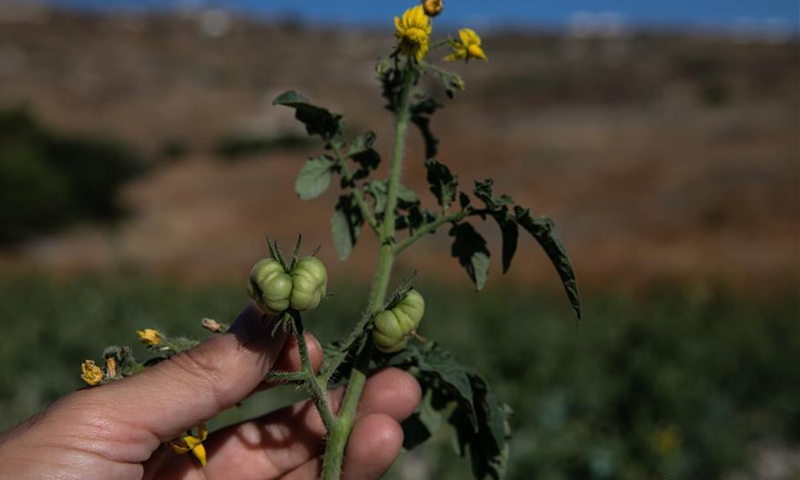
Photo taken on June 15, 2020 shows a branch of unripened tomatoes on Santorini island, Greece. Despite its small size, the island of Santorini boasts three European Union (EU) certified Protected Designation of Origin (PDO) products: cherry tomatoes, fava and wine. (Photo by Lefteris Partsalis/Xinhua)
On the southern and eastern slopes of the Santorini volcano in the south Aegean Sea, away from the swarms of tourists who huddle for a view of the caldera, low vineyards stretch out to the sea, painting the rough landscape with vivid splashes of green.
Santorini's ancient wine industry is famous across the world, as the island produces a range of wines from dozens of Greek grape varieties, principally Assyrtiko.
"Santorini has a small production but gives very special crops. It is the climate, the fact that we don't water them, the harsh weather conditions, like heat, which give highly concentrated aromas and make the products very special," vine grower Stavros Pelekanos told Xinhua on a break from his field work.
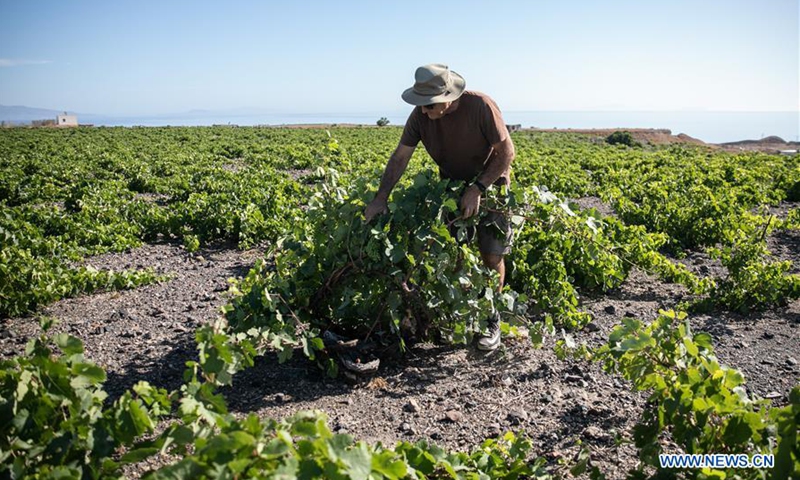
Local vine grower Stavros Pelekanos tends to his vines on Santorini island, Greece, June 15, 2020. Despite its small size, the island of Santorini boasts three European Union (EU) certified Protected Designation of Origin (PDO) products: cherry tomatoes, fava and wine. (Photo by Lefteris Partsalis/Xinhua)
The 49-year-old farmer continues his family's tradition: he grows the local Assyrtiko variety with the same methods people on this island have been using for the past 3,500 years. He doesn't water his vines, as the volcanic soil offers all the minerals they need, and he prunes them in a round, basket-like shape to protect the grapes from the sun and strong wind.
Despite its small size, the island of Santorini boasts three European Union (EU) certified Protected Designation of Origin (PDO) products: cherry tomatoes, fava and wine.
Santorini cherry tomatoes, or "tomataki" as locals call them, stand out for their ridged skin, very small size and full flavor. They can be consumed fresh or in a dried tomato paste, while research conducted by the University of Athens has shown that Santorinian tomataki has a remarkably high concentration in lycopene, an important antioxidant, which helps prevent certain types of cancer.
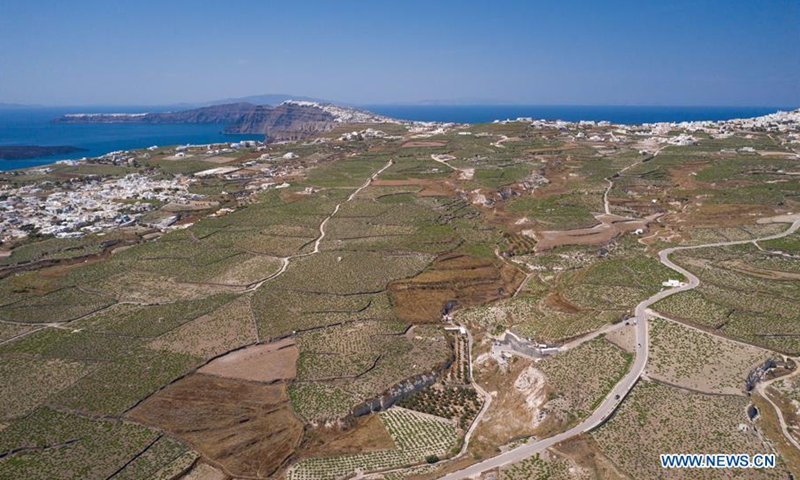
Aerial photo taken on June 14, 2020 shows a view of vineyards stretching along the southern part of Santorini island, Greece. Despite its small size, the island of Santorini boasts three European Union (EU) certified Protected Designation of Origin (PDO) products: cherry tomatoes, fava and wine. (Photo by Lefteris Partsalis/Xinhua)
Fava, on the other hand, is a kind of the legume species Lathyrus clymenum only cultivated on Santorini, known for its velvet texture and sweet, earthy taste. It has a fascinating history of 3,500 years, as clay pots unearthed during excavations at the prehistoric settlement of Akrotiri, which was destroyed by a volcanic eruption around 1500 BC, were found to contain residues of fava, whose genetic material was identical to the fava cultivated today at Santorini.
"It is a very special feeling, knowing that you are eating now exactly the same thing that people were eating and cultivating back then," Stella Kasiola, communication manager at Santo Wines, the union of Santorini cooperatives, noted.
Santorini was born through a series of volcanic eruptions, the first dating back thousands of years. These eruptions endowed the island not only with its dramatic, world-famous caldera in the west, but also with a very rich subsoil and a microclimate in the east that gives produce special flavors.
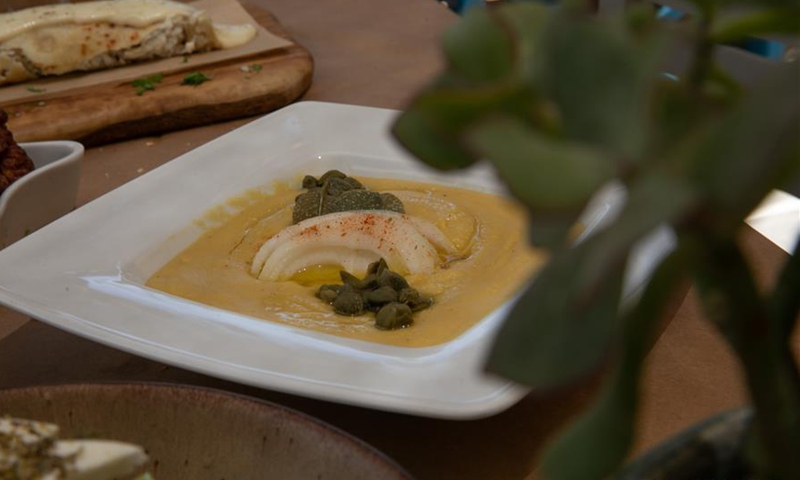
Photo taken on June 14, 2020 shows a dish of traditional pureed fava beans on Santorini island, Greece. Despite its small size, the island of Santorini boasts three European Union (EU) certified Protected Designation of Origin (PDO) products: cherry tomatoes, fava and wine. (Photo by Lefteris Partsalis/Xinhua)
Founded in 1947 and representing all the farmers of the island, the union has undertaken to collect, process, package and promote all the agricultural products of Santorini. Every year, they welcome more than 500,000 visitors from all over the world in their winery, where they offer tours, food and wine tasting.
"Santorini might be famous for its sunset and stunning views of the caldera, but it also has another, more charming aspect," Kasiola stressed.
"What we want to offer our visitors is this unique wine and gastronomic experience, enriching their overall experience of the island," she said.
The king of Santorinian DPO products is the wine, which comes from three local white grape varieties, Assyrtiko, Atheri and Aidani.
"The basic characteristic of fresh Santorinian wine is the minerality it's given by the elements of the volcanic soil, and the saltiness -- a salty aftertaste because we are in the middle of the Aegean Sea and this affects the vineyards," Kasiola explained.
Santo Wines produces approximately 500,000 bottles per year, 30 percent of which are exported, mainly to North America and central Europe. Santo Wines is also taking further steps to enter the Chinese market.
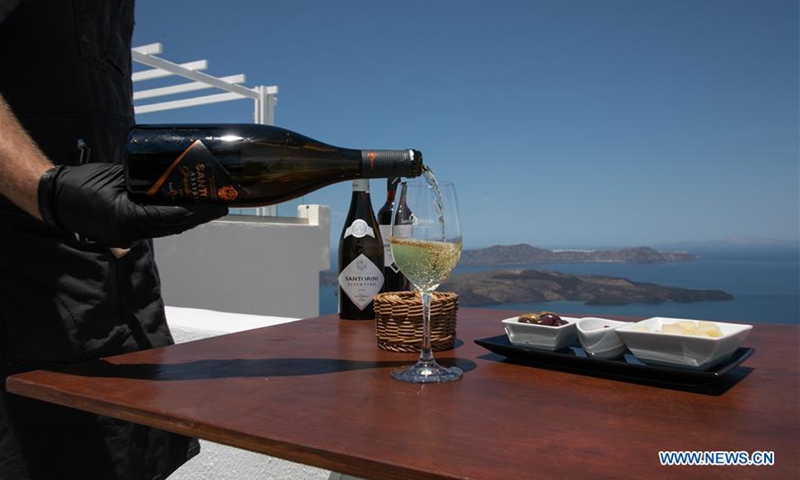
A waiter pours a glass of Assyrtiko wine on Santorini island, Greece, June 14, 2020. Despite its small size, the island of Santorini boasts three European Union (EU) certified Protected Designation of Origin (PDO) products: cherry tomatoes, fava and wine. (Photo by Lefteris Partsalis/Xinhua)
"Many of the Chinese who visit us all year -- which is very important for us -- love the wines, and especially Vinsanto, a sweet wine made of sun-dried Assyrtiko grapes, as well as tomato pastes," Kasiola said.
Despite that, only a few of Pelekanos' generation live exclusively on farming.
"Everyone here has a vineyard and they don't let it go, they try to keep it alive, clean... but only for extra income," he noted.
After a massive tourism boom in the 1970s, Santorini has turned from a rather poor, agricultural island into today's touristic flagship. But some locals also point out that, while this development has yielded very high profits to locals who abandoned their crops, it threatens the preservation of the agricultural heritage and character of the island.
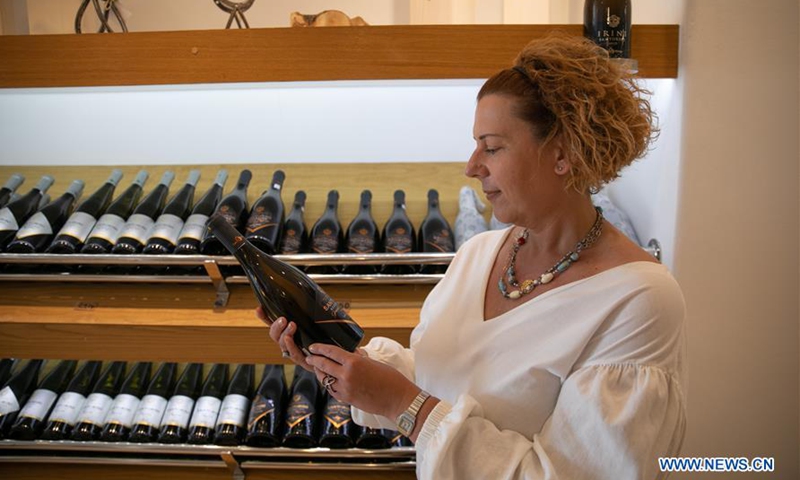
Stella Kasiola, communication manager at Santo Wines, the union of Santorini cooperatives, holds a bottle of award-winning wine on Santorini island, Greece, June 14, 2020. Despite its small size, the island of Santorini boasts three European Union (EU) certified Protected Designation of Origin (PDO) products: cherry tomatoes, fava and wine. (Photo by Lefteris Partsalis/Xinhua)
"We need the new generation to take over and go back in the fields, in the vineyards and cultivate," Kasiola stressed.
Local institutions now say that tourism and agriculture can grow hand-in-hand rather than in rivalry.
"We are all together working on this -- all the wineries and local authorities -- we have realized that this collaboration between agricultural production and tourism is the only way for both sectors to develop in a sustainable way," Kasiola concluded.